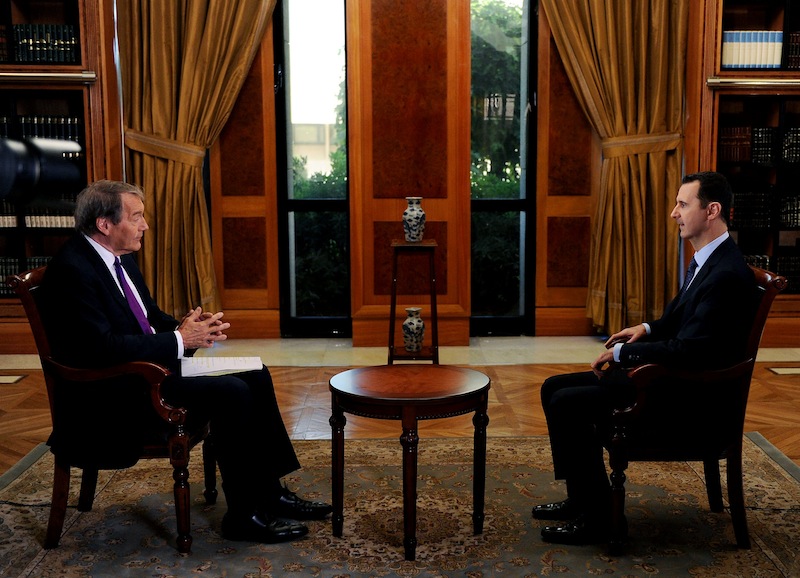NEW YORK — CBS News had essentially given up its pursuit of Syrian President Bashar Assad for an interview because he would not agree to go on “60 Minutes,” until Charlie Rose suggested airing it on PBS.
CBS News Chairman Jeff Fager, who accompanied Rose to Damascus last weekend, said Assad and his team would not go on “60 Minutes” because they wanted to have a say how the interview would be edited, and CBS refused. Assad opted for a longer airing on PBS on Monday night.
The interview was a coup for Rose, who was pursuing it for CBS since last spring. It was the Syrian president’s first TV interview with a U.S. outlet since he spoke to Barbara Walters of ABC News in December 2011, and came as President Barack Obama and Congress are considering a military response to Assad’s purported use of chemical weapons in an attack against rebel forces.
“I’ve never received so much feedback for a single interview,” Rose said Tuesday.
Rose, who is host of “CBS This Morning” in addition to his own PBS interview show, landed the interview with a promise that PBS would air the talk at the same length as an interview Rose had done with President Barack Obama this summer. That’s how it played out, although the Assad talk was edited slightly for length.
“In the end, it was so important that it was great that we figured out a way around it,” said Fager, also executive producer of “60 Minutes.”
Assad got the format he wanted. But along with a time conflict with the U.S. Open, it may have cost him in terms of audience size. PBS aired the interview in prime time on most stations, bumping “Antiques Roadshow.” It was seen by an estimated 1.2 million people, according to the Nielsen company, or less than half the typical audience for the antiques show. CBS has a much bigger footprint: An estimated 9.3 million people watched a repeat episode of “60 Minutes” on Sunday.
Despite the earlier concerns about editing, Assad and his aides put no restrictions on the interview, Fager said, saying they anticipated and expected tough questions. Assad got them, though he didn’t always answer; in response to a Rose question about stockpiles of chemical weapons, Assad said, “We don’t say yes, we don’t say no.”
Rose asked Assad what responsibility he felt about the death and destruction in his country. He asked him to respond to critics who called him a butcher and compared him to “some of the worst dictators to walk the face of the Earth.” He also asked whether Assad wasn’t following the example of his father, who also led Syria, in “ruthlessly” eliminating opponents.
“Sometimes there’s power in the questions themselves,” Rose said. “It has an importance, regardless of whether or not the person answers.”
Rose said he prepared for two days and carefully mapped out the interview. It seems contradictory, but that actually makes room for spontaneity, he said.
“It was as good an interview as I’ve ever seen in this kind of a situation,” Fager said.
CBS first aired portions of the Assad interview on “CBS This Morning” on Monday, continuing on Tuesday. Although it missed the deadline for “60 Minutes” last week, a story will air on the interview this weekend, Fager said.
CBS found itself in an odd situation with its flagship “CBS Evening News” on Monday. It had an exclusive with the Assad interview, and anchor Scott Pelley was one of a handful of television journalists granted an interview with Obama on Monday. Yet the evening news was pre-empted on all but the West Coast by CBS Sports’ telecast of the U.S. Open men’s tennis finals.
The network posted Pelley’s interview online at 6 p.m. Eastern and cut into the tennis match for a two-minute report on the Obama interview.
“That’s just bad luck,” Fager said. “It happens sometimes.”
Although CBS’ first choice in these stories is still “60 Minutes,” there were plenty of other ways for it to be seen, he said.
“It stops really being about where it’s going to air because the ability to see it out there online and the ability for people to watch it in so many ways has changed so dramatically,” he said.
Send questions/comments to the editors.



